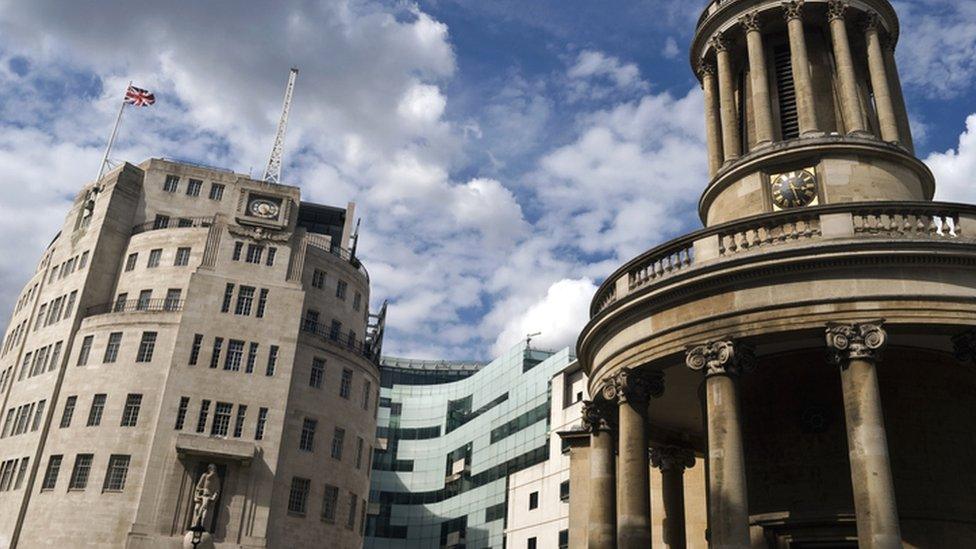United Kingdom media guide
- Published
This page is no longer being updated. It was last updated on 22 May 2023

BBC Broadcasting House in London, the BBC has been part of national life since 1922
The UK has a strong tradition of public service broadcasting and an international reputation for creative programme-making.
The fledgling BBC began daily radio broadcasts in 1922 and quickly came to play a pivotal role in national life. The Empire Service - the forerunner of the BBC World Service - established a reputation worldwide. The BBC is funded by a licence fee, which all households with a TV set must pay.
Commercial TV began in 1955 with the launch of ITV. Commercial radio arrived in the 1970s, although ship-based stations flourished in the 1960s before being outlawed. Hundreds of privately-owned radio and TV stations now compete with the BBC for listeners and viewers.
Home-grown soaps top the TV ratings, and many British viewers follow the ups and downs of life in East London's Albert Square, the setting for the BBC's EastEnders, and Coronation Street - ITV's soap about northern English working-class life. Reality TV shows attract large audiences.
Once-dominant terrestrial TV networks face strong competition from digital satellite and cable, which offer hundreds of channels, and digital terrestrial TV (DTT), which carries a smaller number of mainly free-to-air channels. Terrestrial digital radio (DAB) has had a slower start.
The media are free and able to report on all aspects of British life. The variety of publications reflects the full spectrum of political opinion. In recent years, printed newspaper circulations have been sliding while online readership has surged.
News Corp, owner of The Times through its News UK subsidiary, has spearheaded attempts to make money from online content by charging readers for access.
Press regulation
In 2012, a judge-led inquiry recommended a new system of self-regulation for the press, backed by legislation. The inquiry followed a phone-hacking scandal at a News Corp title.
Politicians agreed to set up a new watchdog with powers to impose heavy fines and force newspapers to publish corrections. In 2013, the system was backed by a Royal Charter, rather than by law.
But the industry objected and said the Royal Charter plan would give politicians too much power. Most publishers have stayed outside the system.
UK online
There were 65 million internet users by July 2022, comprising 95% of the population (Worldinternetstats.com). There were 57 million active social media users by February 2022, some 84% the population (Statista.com, external). Facebook is the leading platform.
The BBC is Britain's most popular online news destination.
Press
The Daily Telegraph, external - daily
Financial Times, external - daily, business
The Guardian, external - daily
The Independent, external - online, former print daily
The Times, external - daily
The Sun, external - daily tabloid
The Mirror, external - daily tabloid
The Daily Mail, external - daily tabloid
The Daily Express, external - daily tabloid
The Scotsman, external - Scottish daily
Western Mail, external - Welsh daily
Television
BBC TV - operates BBC1, BBC2 and digital services including BBC News channel
BBC World News - commercially-funded international news channel
ITV, external - major commercial network, organised around regional franchises
Channel 4, external - commercially funded but publicly owned national station
Channel 5, external - national commercial channel
Independent Television News (ITN), external - supplier of news to ITV, Channel 4 and other outlets
Sky, external - operator of digital satellite platform, Sky, and provider of film, entertainment channels and Sky News
Radio
BBC Radio - national services include contemporary music station Radio 1, adult music station Radio 2, cultural network Radio 3, flagship speech station Radio 4 and news and sport station Five Live
BBC Radio nan Gaidheal - Gaelic-language station for Scotland
BBC Radio Ulster - for Northern Ireland
BBC Radio Cymru - Welsh-language
BBC Asian Network - for Asian communities in the UK
BBC World Service - major international broadcaster, heard worldwide via shortwave and on FM relays, programmes in more than 40 languages
LBC, external - commercial, news and talk
Absolute Radio, external - commercial, pop and rock
talkSPORT, external - commercial, sports
Classic FM, external - commercial, classical